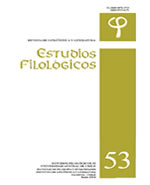Sobre inicios y cierres en el discurso político
Contenido principal del artículo
Resumen
El análisis de exposiciones largas (por ejemplo, de diez o más minutos) exige la creación de unas unidades discursivas capaces de segmentar tales discursos más allá de las ya tradicionales unidades de procesamiento: los enunciados y sus subunidades los actos y los subactos. Este artículo pretende esbozar unas categorías superiores de división, así como su aplicación a los "Debates en torno al Estado de la Nación", un debate político que se celebra anualmente en España. Hemos distinguido dos tipos de unidades mayores (unidades temático-textuales): por un lado, las secuencias y sus subunidades, el inicio, desarrollo y cierre, y, por otro lado, las subsecuencias, y sus subunidades el tema, subtema, sub(sub)tema, etc. En ellas, se integrarán las ya mencionadas unidades de procesamiento (unidades ilocutivo-tectuales). Tal segmentación permitirá dar una mayor uniformidad al estudio discursivo de los mecanismos mediante los cuales conseguimos efectos (cortesía, ironía, argumentación, racismo, etc.).

